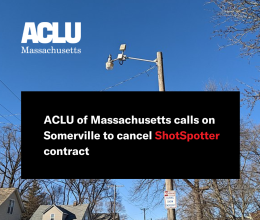
Carol Rose, executive director of the ACLU of Massachusetts, today released the following statement in response to the U.S. Supreme Court decision in Carpenter v. U.S.:
“This is a groundbreaking victory for privacy rights in the digital age. The Supreme Court has rejected the government’s claim that we must sacrifice our Fourth Amendment rights in order to use modern technology. For twenty years, people in the United States have used cell phones, but federal law is only now catching up. While today’s decision directly protects our historical cell phone location data with a warrant, it also provides a framework for safeguarding other sensitive digital information — from our emails and smart home appliances to technology that is yet to be invented.
“This historic decision also shows that, once again, Massachusetts leads the way on privacy. Four years ago, in another ACLU case, the Massachusetts Supreme Judicial Court expanded privacy rights under the Massachusetts state constitution. We are pleased that the United States Supreme Court followed suit, ensuring that Fourth Amendment protections keep pace with advancing technology.
“The Court ruled the right way, but there’s more to be done. To ensure Bay Staters are protected from warrantless electronic snooping, the Massachusetts state legislature must pass comprehensive digital privacy law. It’s time to pass the Electronic Privacy Act.”
Background:
In 2011, FBI agents in Detroit obtained several months’ worth of location records from cell phone companies for suspects in a robbery investigation — without a warrant.
After Timothy Carpenter was convicted at trial, based in part on the cell phone location evidence, he argued that the government violated his Fourth Amendment rights when it obtained his location records from his cell phone provider without a warrant.
The ACLU became co-counsel with Mr. Carpenter’s defense attorney to file a petition for review by the Supreme Court. In June 2017, the Supreme Court agreed to hear the case, and it was argued five months later.
The ACLU’s argument before the Supreme Court referenced a 2014 Massachusetts high court decision. In Commonwealth v. Augustine – an ACLU of Massachusetts case – the Massachusetts Supreme Judicial Court broadened constitutional privacy protections for every person in the state, and agreed with the ACLU that all Massachusetts residents and visitors have a reasonable expectation of privacy in cell site location data.






